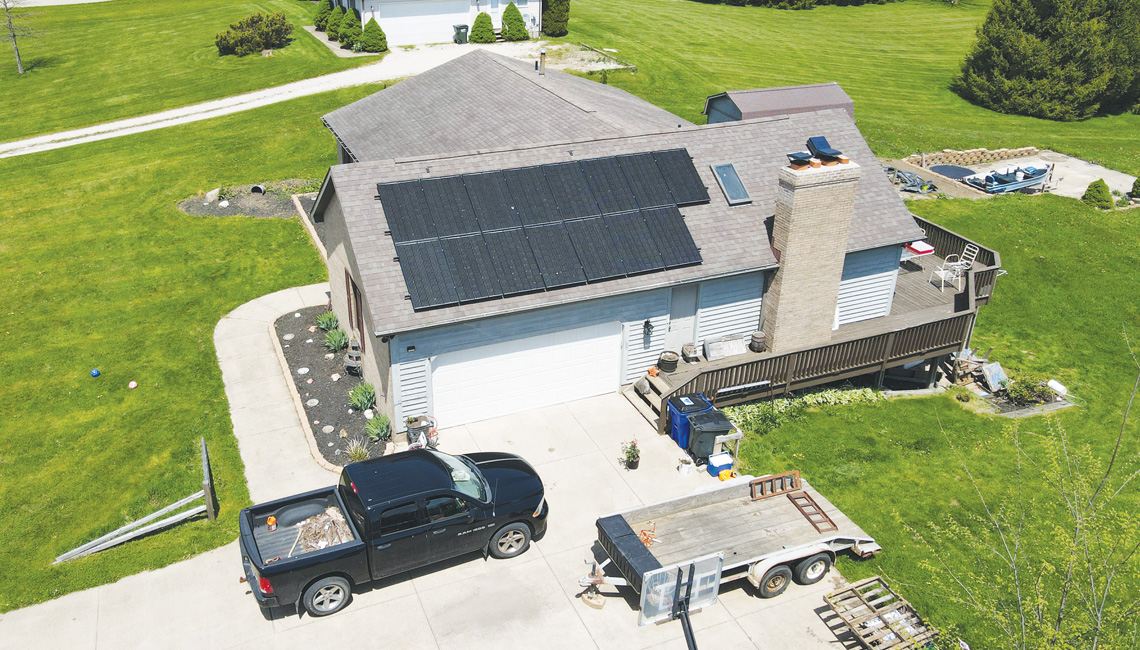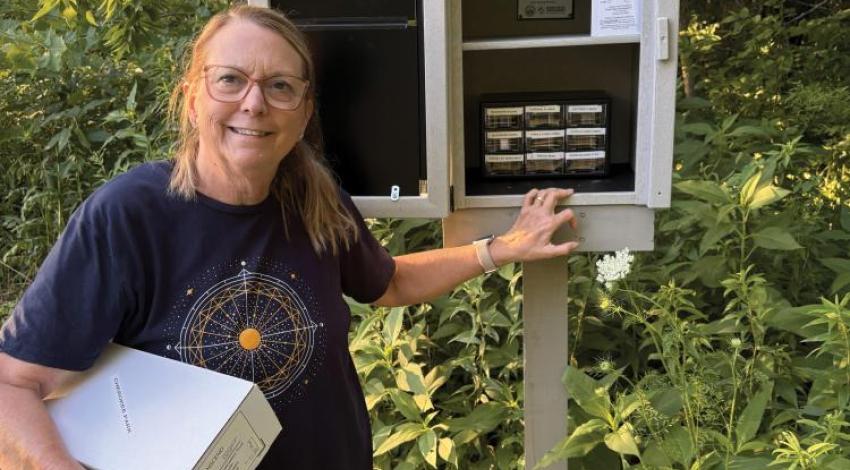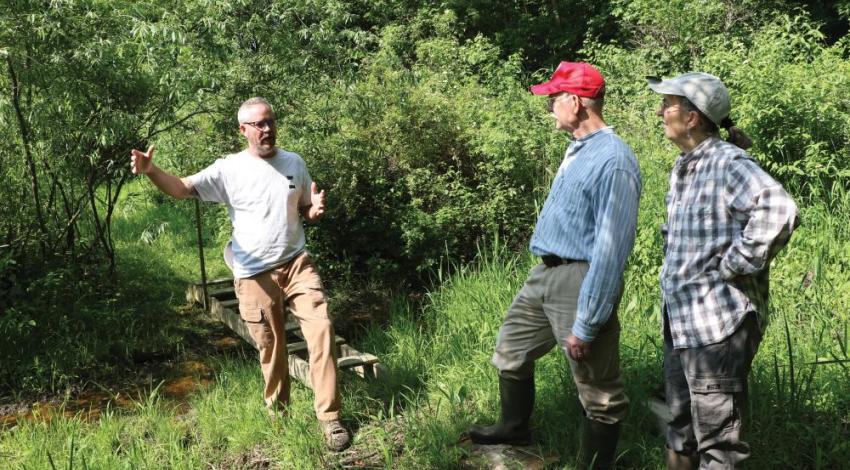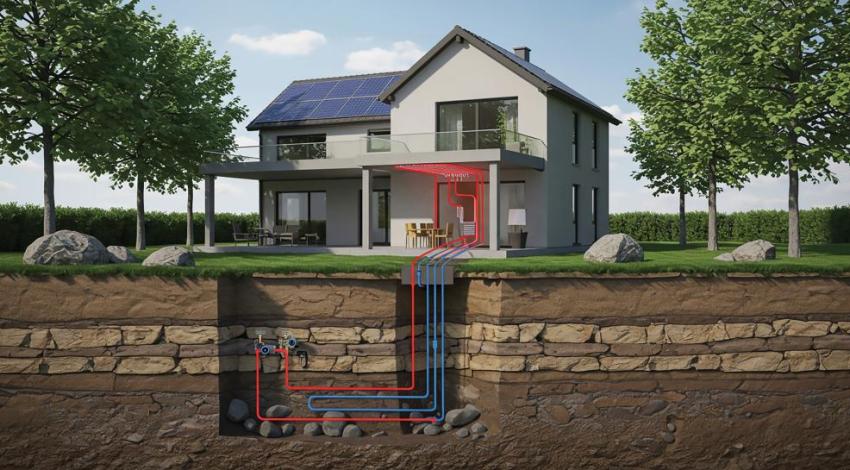The hours of bright sunshine that come with scorching Ohio summers often spur people to consider harnessing energy from the sky’s brightest star with rooftop solar panels. It sounds even more attractive when smooth-talking salespeople make promises that sound almost too good to be true.
The reality of going solar, however, isn’t nearly as black and white as those salespeople might make it sound. As with most things that have to do with electricity in the homes of co-op members, a partnership between the homeowner, the cooperative, and the contractor leads to the best outcomes. The more informed members are throughout the process, the happier they are with the results of their solar installation.
The renewable, green energy source, generated and transmitted by Buckeye Power for OEC members, has been available since 2017 when the OurSolar program was launched.
Bright side
Demarco Deshaies of Rockridge in Hocking County decided to investigate solar as a backup after losing electric service for several days following a devastating February 2022 winter storm.
“We didn’t have water when we were without power, or internet, and we lost a lot of food,” says Deshaies, a South Central Power Company member. With a small child and wife at home, Deshaies didn’t want to go through that experience again, so he began researching solar as a backup power solution, to keep the basics working in case of similar outages in the future.
Deshaies, a do-it-yourselfer, wanted to install the solar system himself. He checked out some YouTube videos and studied the solar facts sheets on South Central Power’s website, then contacted Jacob Atkins, an energy advisor at South Central Power. The two worked together to make sure Deshaies’ plan would meet all state and local requirements, would integrate into the grid, and made overall sense. Once he had all the facts, he could move forward with confidence.
The total cost of Deshaies’ solar panel system was $16,400, which included 14 rooftop panels and a battery to store power. It took him three days and some help from friends to install the system, and it’s been up and supplying power since Memorial Day weekend. “A sunny day supplies just a little more power than we consume in a day,” Deshaies says, “and a cloudy, rainy day produces about half what we need.” He programmed the system to prioritize keeping his 10-kWh battery fully charged so he’ll have backup power in the event of an outage.
He’s been happy enough that he’s considering installing more panels and battery storage to double his generation and storage capacity and potentially eliminate his $150-per-month electric bill. Deshaies did the math and says his break-even date for the cost of the system would be 11 years, but that a 26% tax credit for buying the system would cut that time to 6 years.
Dark side
Over the past two years alone, 62 co-op members of Wellington-based Lorain-Medina Rural Electric Cooperative and Attica-based North Central Electric Cooperative have contacted the co-ops’ energy advisors with tales of roofs collapsing, inoperable solar panel systems sold by door-to-door salespeople using high-pressure sales tactics, and life savings up in smoke.
“Those are just the ones who have called us,” says Ed VanHoose, general manager of both LMRE and NCE. “We know there are many, many more than that.”
Glenn Miller, president and CEO of Holmes-Wayne Electric Cooperative in Millersburg, has heard similar horror stories. “It’s heartbreaking to see some of our members have been misled and taken financial advantage of,” Miller says. “We are always looking out for the best interests of our members, which is why we encourage them to contact us regarding home solar installation.”
The stories, of course, aren’t limited to just a few co-ops; complaints come in from every corner of the state. In fact, the Better Business Bureau took in nearly 900 grievances raised by consumers against one company alone — about 100 were escalated to the state attorney general’s office.
VanHoose and Miller decided to act. In April, Holmes-Wayne Electric Cooperative issued an urgent warning to its co-op members to call their cooperative before signing a solar contract.
Retired Ohio law enforcement officer Mark Mondello saw Holmes-Wayne’s warning post on Facebook. He wishes he had seen it two years ago before he purchased 15 panels for $26,000.
“The sales rep said, ‘there’s a tax credit available of $8,000, but tomorrow it will be gone, you have to sign now if you want to take advantage of that,’” Mondello
says. “He really pushed us hard to get that sale right now. If we’d had time to look further into the company and even just waited a week, we wouldn’t have signed or would have gone with a different company — or not bought solar panels at all.”
It’s a decision he regrets every day. “Why would I spend $26,000 to save $15 a month on my electric bill?” Mondello and his wife wanted to save money and also wanted to help the environment. Now they have a leaky roof and a $170 monthly loan payment for the solar panel system. Mondello’s mission now is to warn other consumers and co-op members.
“I don’t like when people rip other people off — that’s why I became a law enforcement officer,” he says. “I know how valuable a dollar is to people, and I don’t want anyone to have to go through what we’ve gone through.”
Co-op leaders like VanHoose and Miller urge their members not to sign a contract without calling the cooperative first — because there are lots of questions that need to be answered: Are you being overcharged? Will the system integrate with the grid? Will it pass required safety inspections?
“They claim that your bill is going to be zero, but it’s never going to be zero,” VanHoose says. “To achieve that, you would have to buy enough solar panels and battery storage to supply power 24/7, and that is extremely expensive — far more than a monthly electric bill.”
Another solar option
Harnessing the power of the sun with solar is possible without buying an individual rooftop solar panel system. The renewable, green energy source, generated and transmitted by Buckeye Power for OEC members, has been available since 2017 when the OurSolar program was launched.
“Renewables, including solar, represent a small but growing part of OEC’s supply,” says Ben Wilson, director of power engineering delivery at Buckeye Power, the generation cooperative that supplies power to all of Ohio’s electric distribution co-ops. The growth coincides with what Wilson describes as growing demand for solar from co-op members across Ohio.
The majority of Buckeye Power’s supply comes from coal plants, but hydroelectricity and solar are part of its power generation portfolio too.
The OurSolar program, which offers co-op members the opportunity to prioritize solar as their energy source, is growing. “The latest addition is a 2-megawatt solar array east of Findlay that will be energized this summer,” says Wilson, noting that the total power generation from solar will increase to 4 megawatts. “We are excited about these additions, and we continue to look for ways to add diverse and cost-effective resources to our supply.”
“If a co-op member’s goal is to reduce reliance on carbon-based resources, it is usually most effective to first reduce energy usage before considering renewable options,” Wilson adds. “Energy efficiency projects like LED lighting retrofits, insulation and air sealing, and thermostat setbacks provide greater reduction at a lower overall cost and should be prioritized over rooftop solar.”
Holmes-Wayne President and CEO Glenn Miller advises contacting your cooperative’s energy advisor.
“We can review your electric consumption, complete a home energy audit, and make sure your home is as energy efficient as possible. These are all key to the decision to make such a large investment in solar panels,” Miller says. “We offer a great list of questions to ask the solar company so our co-op members can protect themselves. If it sounds too good to be true, it most likely is.”
If you have a complaint about a solar installer, you can contact the Ohio attorney general’s office at 800-282-0515 or file online at www.ohioprotects.org/file-a-complaint.











